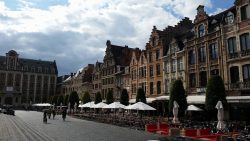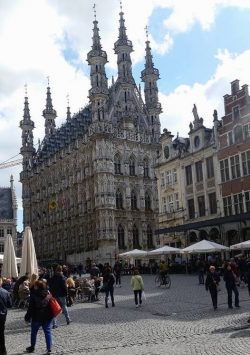Date: 12/01/2018
Dan Devine is an SCDTP-funded PhD candidate in Politics and International Relations. His PhD is on political dissatisfaction in the context of European integration, and the effect this has on government legitimacy and policy making. Other research interests include voting behaviour, multilevel governance and public opinion’s relationship with policy more broadly. He has also worked on devolution in the UK, and its relationship with political identity as well as its consequences for skills and education policy.
As part of the ESRC South Coast DTP funding, it’s possible to visit an overseas University to disseminate research, write a paper, or expand your research network. All of these are crucial parts of both professional and academic development, and I knew I wanted to go abroad and experience a different research environment. As part of this, I visited the Centre for Political Research at the Katholieke Universiteit (KU) Leuven in Belgium for three months at the end of my first year. In this blog, I’ll talk about how and why I chose this visit, what I got out of it, and then some advice for those thinking about an overseas institutional visit.
Choosing an Institution
Perhaps the most important determinant of a successful visit is where you want to visit; this usually translates to who you want to work with. Over the last two years, I have kept almost all of my research on the online library  Zotero. My starting point was to sort all of these (nearly 1000!) publications by name, and see who I had read and referenced the most, which seemed like a good indicator of who was closest to my interests. I then got in contact with this person, who was more than happy to host me and told me of upcoming workshops and conferences. This was doubly attractive as I work on a consultancy basis in Brussels, which is about 20 minutes away from Leuven by train: the visit offered me both an academic and professional opportunity. I also discussed this with two people in Leuven, one who had worked directly with my host professor. I visited for a day to check out the area, and learned that Leuven is both beautiful and one of the best beer cities in the world.
Zotero. My starting point was to sort all of these (nearly 1000!) publications by name, and see who I had read and referenced the most, which seemed like a good indicator of who was closest to my interests. I then got in contact with this person, who was more than happy to host me and told me of upcoming workshops and conferences. This was doubly attractive as I work on a consultancy basis in Brussels, which is about 20 minutes away from Leuven by train: the visit offered me both an academic and professional opportunity. I also discussed this with two people in Leuven, one who had worked directly with my host professor. I visited for a day to check out the area, and learned that Leuven is both beautiful and one of the best beer cities in the world.
What I got out of the visit
The visit was extremely rewarding. Leuven provided an excellent research environment and numerous workshops and relevant conferences, including at the Palais Des Acadèmies and the Parliament of the German-speaking region, which provided an opportunity to meet people working on the same topics. I regularly met my host professor and  other staff in the department to talk about my research, and participated in their weekly research seminars. Because Brussels is so well-connected, I also travelled to other universities (and countries!) to talk about my work. The visit culminated in writing a paper under the guidance of my host, which I presented to the department and submitted to a leading British journal on my return to Southampton. I also completed the empirical analysis which forms the basis of another paper, and have been invited back to Leuven in 2018.
other staff in the department to talk about my research, and participated in their weekly research seminars. Because Brussels is so well-connected, I also travelled to other universities (and countries!) to talk about my work. The visit culminated in writing a paper under the guidance of my host, which I presented to the department and submitted to a leading British journal on my return to Southampton. I also completed the empirical analysis which forms the basis of another paper, and have been invited back to Leuven in 2018.
The visit enabled me to work more closely with my job at the Open Society European Policy Institute as it was easier to attend events and meetings. The project there is related to my PhD, and involves research partners across six countries as well as people working in the European Parliament and Commission. The experience of working on a non-academic, policy-specific project developed at a pan-European level was invaluable, as was getting feedback on my research from people within the Commission and other think tanks.
Overall, the visit offered both academic and professional development. Through both of these, I greatly expanded my research network and had the space to work on related academic papers and deepen my engagement with the policy world. The visit also gave me a different perspective on the PhD and what I want to achieve with it – and such a perspective is a unique benefit of seeing how PhDs work in other countries.
Advice for choosing an OIV
If you’re thinking of choosing to do an OIV, here are five points that I either did do, or wish I had done!
- Make sure you know the environment you will be in: do they have opportunities for you to present and go to conferences or workshops? What’s the relationship between PhD students and faculty?
- It’s important that you and your host are clear about what you want to get out of it, and what role your host will play in that.
- Make sure you have fun: you’ll be there for three months after all, and it’s important to enjoy it. You don’t want to be somewhere you’ll be unhappy. Belgium has a great beer, football and music culture!
- Be realistic about what you can achieve. Three months isn’t very long, and it’s stressful if you go with a shopping list of objectives. Work on a specific paper or topic.
- Make plans if you want a long-term outcome, whether that’s a future collaboration or returning to the institution to present again.